How to Play Soft 18 in Blackjack?
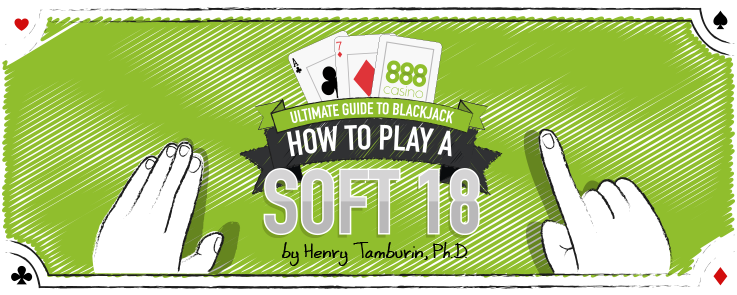
By Anonymous
|
|
One of the hands that blackjack players often misplay is soft 18. This is a hand that totals 18 and contains an ace counted as 11. Examples of soft 18 hands are: A-7 or A-3-4.

The reason the above hands are classified as “soft” 18 is because the strategy for playing them is different from a hand that totals 18 and that either doesn’t contain an Ace (e.g., 10-8), or, if an Ace is present, it is counted as 1 (e.g., 5-9-A-3). (These are known as “hard” 18 hands.)

When you are dealt a soft 18, you have three playing options:
• Double Down
• Hit
• Stand
Which option is best depends on three variables:
• Whether the soft 18 hand is composed of two or more cards
• The number of decks of cards you are playing against
• Whether the rules specify the dealers must hit their soft 17 (h17) or stand (s17).

OPTIMAL STRATEGY
Double- and Multi-Deck Games
In double- and multi-deck games where the dealer stands on soft 17 (s17):
• If dealer shows a 3, 4, 5, or 6, you should double down
• If the dealer shows a 2, 7, or 8, you should stand
• If dealer shows a 9,10, or Ace, you should hit (but see Multi-Card information, below, for a special case in double-deck)
If the rules specify that the dealer must hit soft 17 (h17), then you should also double down against a dealer’s upcard of 2.
Single-Deck Games
In single-deck games, where the dealer stands on soft 17 (s17):
• If dealer shows a 3, 4, 5, or 6, you should double down
• If the dealer shows 2, 7, 8, or Ace, you should stand
• If the dealer shows a 9 or 10, you should hit
If the rules specify that the dealer must hit soft 17 (h17), then you should hit against a dealer’s Ace (rather than stand).

• If you stand, you’ll win 41% of the hands and lose 59%
• If you hit, you’ll win 43% of the hands and lose 57%
Notice that you will lose more hands than you win regardless of what strategy you invoke; however, you win 2% more hands and lose 2% fewer, for a net gain of 4%, by hitting soft 18 against a dealer’s 10 upcard vs. standing, making hitting the better strategy.
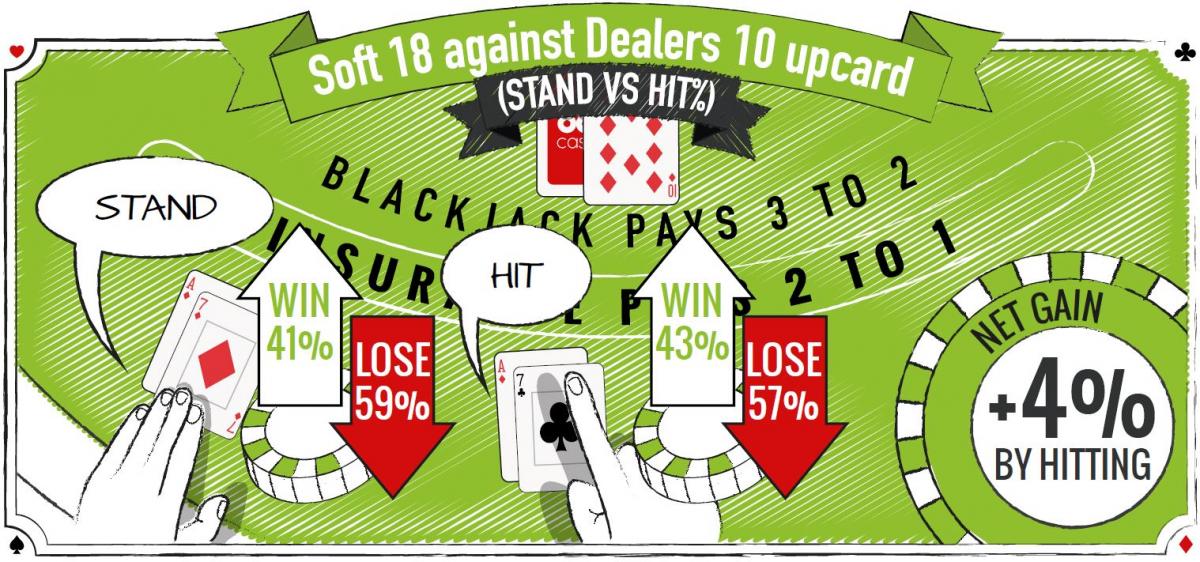

MULTI-CARD SOFT 18
• If you have a multi-card soft 18, or the rules don’t allow soft doubling, always stand instead of doubling when the dealer’s upcard is 3 through 6 (with s17), or 2 through 6 (if h17).
The following color-coded strategy tables summarize the above rules for playing a soft 18.
 DOUBLE-AND MULTI-DECK IF RULES SPECIFY S17
DOUBLE-AND MULTI-DECK IF RULES SPECIFY S17
Dealer’s Upcard
*But stand if Double-Deck and multi-card soft 18.
DOUBLE- AND MULTI-DECK IF RULES SPECIFY H17
Dealer’s Upcard
SINGLE-DECK IF RULES SPECIFY S17
Dealer’s Upcard
SINGLE-DECK IF RULES SPECIFY H17
Dealer’s Upcard
The following are some tips that may help you remember the strategy rules for soft 18.
• If the rules are s17, you always double down soft 18 against a dealer’s 3 through 6 regardless of the number of decks of cards.
• If the rules are h17, in a double- and multi-deck game, you always double down against a dealer’s 2 through 6.
• If you are playing a single-deck game, you always double down against a dealer’s 3 through 6, and if s17, you should stand against a dealer’s ace (rather than hit).

The reason the above hands are classified as “soft” 18 is because the strategy for playing them is different from a hand that totals 18 and that either doesn’t contain an Ace (e.g., 10-8), or, if an Ace is present, it is counted as 1 (e.g., 5-9-A-3). (These are known as “hard” 18 hands.)

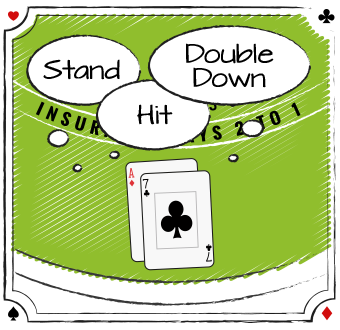 PLAYING OPTIONS
PLAYING OPTIONS
When you are dealt a soft 18, you have three playing options: • Double Down
• Hit
• Stand
Which option is best depends on three variables:
• Whether the soft 18 hand is composed of two or more cards
• The number of decks of cards you are playing against
• Whether the rules specify the dealers must hit their soft 17 (h17) or stand (s17).

OPTIMAL STRATEGY
(LAND-BASED AND ONLINE CASINOS)
Double- and Multi-Deck GamesIn double- and multi-deck games where the dealer stands on soft 17 (s17):
• If dealer shows a 3, 4, 5, or 6, you should double down
• If the dealer shows a 2, 7, or 8, you should stand
• If dealer shows a 9,10, or Ace, you should hit (but see Multi-Card information, below, for a special case in double-deck)
If the rules specify that the dealer must hit soft 17 (h17), then you should also double down against a dealer’s upcard of 2.
Single-Deck Games
In single-deck games, where the dealer stands on soft 17 (s17):
• If dealer shows a 3, 4, 5, or 6, you should double down
• If the dealer shows 2, 7, 8, or Ace, you should stand
• If the dealer shows a 9 or 10, you should hit
If the rules specify that the dealer must hit soft 17 (h17), then you should hit against a dealer’s Ace (rather than stand).

REASON FOR STRATEGY
You will always win more or lose less by following the above strategy vs. using an alternate strategy. For example, let’s look at soft 18 against a dealer’s 10 upcard in a six-deck game with s17. Excluding tied hands, this is what you can expect:• If you stand, you’ll win 41% of the hands and lose 59%
• If you hit, you’ll win 43% of the hands and lose 57%
Notice that you will lose more hands than you win regardless of what strategy you invoke; however, you win 2% more hands and lose 2% fewer, for a net gain of 4%, by hitting soft 18 against a dealer’s 10 upcard vs. standing, making hitting the better strategy.

MULTI-CARD SOFT 18 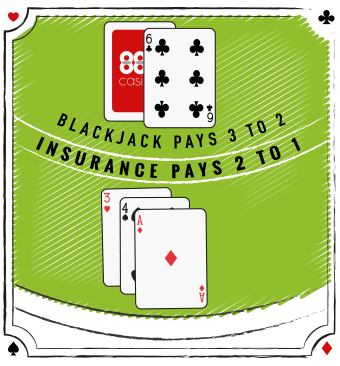
When you are dealt a soft 18 containing three or more cards, doubling down is not allowed. For example, suppose you were dealt a 3 plus 4 and the dealer’s upcard is a 6. You hit and draw an ace giving you a soft 18. The playing rules in most land-based and online casinos prohibit you from doubling down on a hand once you draw a third card; therefore, if you hold a multi-card soft 18, you should always stand against a dealer’s 3 through 6 upcard. (Ditto against a dealer’s 2 upcard if the rules are h17). In addition, in the special case of double-deck, s17, you should stand on your multi-card soft 18 rather than hit.
Likewise, the rules in some land-based and online casinos let players double down only on hard hands (i.e., they are prohibited from doubling on soft hands). In addition, the rules in most video blackjack games in land-based casinos don’t allow players to double down on soft hands. So the bottom line is this:• If you have a multi-card soft 18, or the rules don’t allow soft doubling, always stand instead of doubling when the dealer’s upcard is 3 through 6 (with s17), or 2 through 6 (if h17).
The following color-coded strategy tables summarize the above rules for playing a soft 18.
| NOTE: | Ds means double down if allowed; otherwise, stand | S means Stand | H means Hit | S17 means dealer must stand on soft 17 | H17 means dealer must hit soft 17 |

Dealer’s Upcard
| 2 | 3 | 4 | 5 | 6 | 7 | 8 | 9 | 10 | A* | |
| A-7 | S | Ds | Ds | Ds | Ds | S | S | H | H | H |
DOUBLE- AND MULTI-DECK IF RULES SPECIFY H17
Dealer’s Upcard
| 2 | 3 | 4 | 5 | 6 | 7 | 8 | 9 | 10 | A | |
| A-7 | Ds | Ds | Ds | Ds | Ds | S | S | H | H | H |
SINGLE-DECK IF RULES SPECIFY S17
Dealer’s Upcard
| 2 | 3 | 4 | 5 | 6 | 7 | 8 | 9 | 10 | A | |
| A-7 | S | Ds | Ds | Ds | Ds | S | S | H | H | S |
SINGLE-DECK IF RULES SPECIFY H17
Dealer’s Upcard
| 2 | 3 | 4 | 5 | 6 | 7 | 8 | 9 | 10 | A | |
| A-7 | S | Ds | Ds | Ds | Ds | S | S | H | H | H |
The following are some tips that may help you remember the strategy rules for soft 18.
• If the rules are s17, you always double down soft 18 against a dealer’s 3 through 6 regardless of the number of decks of cards.
• If the rules are h17, in a double- and multi-deck game, you always double down against a dealer’s 2 through 6.
• If you are playing a single-deck game, you always double down against a dealer’s 3 through 6, and if s17, you should stand against a dealer’s ace (rather than hit).
QUIZ
To be sure you have the strategy down pat for playing a soft 18, decide how you would play the following hands against the indicated dealer’s upcard. (Assume a double- or multi-deck game with s17 unless otherwise indicated.)
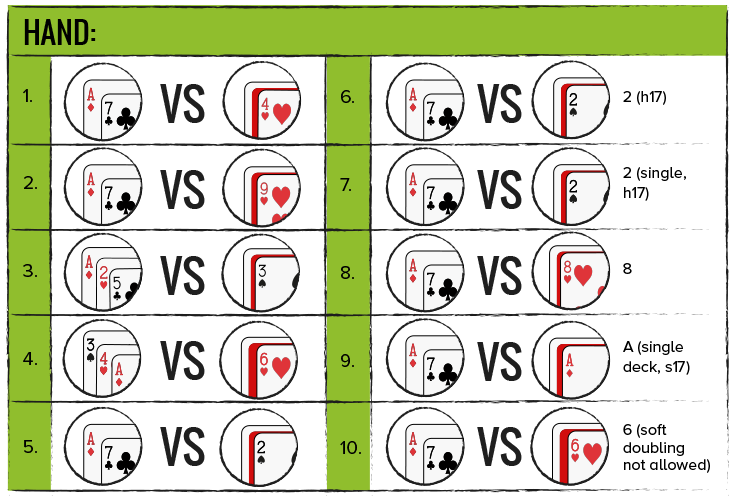

For the complete basic playing strategy for any set of playing rules, consult Chapter 3 in the Ultimate Blackjack Strategy Guide.


For the complete basic playing strategy for any set of playing rules, consult Chapter 3 in the Ultimate Blackjack Strategy Guide.


